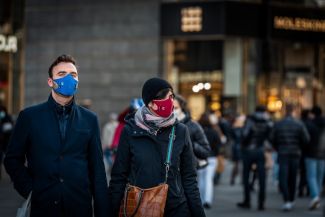
On March 19, German Chancellor Angela Merkel announced that she intends to maintain strict quarantine measures in the country until at least April 18. During a previous meeting in March, state leaders approved a cautious easing of quarantine, despite Merkel's objections, warning of the spread of new strains of Covid-19. However, the number of new cases of coronavirus in Germany began to increase sharply and the country started talking about the third wave of the pandemic.
Germany is also considering a mandatory quarantine for all those entering the country from abroad. On Saturday, Merkel urged fellow citizens not to travel to other countries during the upcoming Easter holidays.
The third wave of coronavirus is gaining momentum in Poland as well. On Sunday, the country registered 21,849 new cases of Covid-19, which is 27% more than the daily number of new diagnoses a week ago. Against this background, the role authorities are introducing a lockdown across the country from March 20.
The toughened quarantine measures will last until April 9.
Hotels, cinemas, museums, fitness clubs, cultural institutions and sports facilities, including ski slopes, will be closed in accordance with the restrictive measures. In addition, the operation of shopping centers will be limited, and students from the first to the third grade will study remotely. It is noted that the lockdown will also affect the Easter week.
On March 15, it became known that in Poland the increase in the incidence of coronavirus infection for the week was 75%. The Ministry of Health called the epidemiological situation in the country "alarming".
Also, new restrictive measures due to COVID-19 came into force in Bulgaria. They will run from March 22 to March 31. During the new lockdown, catering establishments will be closed, only take-out and delivery work is allowed. Also stores, except for those that sell basic necessities (grocery, pharmacies, telecom operators' offices, pet stores, etc.). The work of kindergartens, schools and universities was stopped (except for training in medical specialties, classes for schoolchildren and students were transferred to a distance format). Fitness centers, swimming pools and sports centers are also closed. An exception was made for professional athletes who need to train; the sports themselves will be held without spectators. Also, any events with the presence of more than 15 people are prohibited, and employers were asked to transfer up to 50% of employees to remote work.




